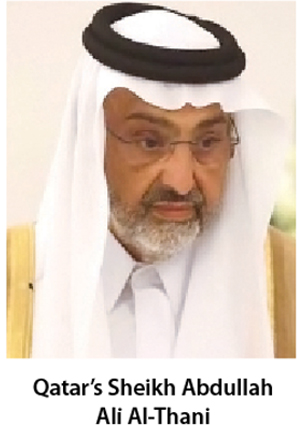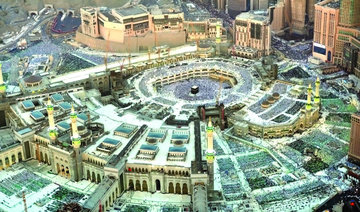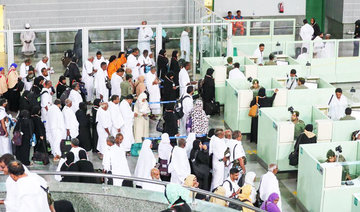JEDDAH: Following a series of high-profile meetings with the Saudi leadership, which resulted in King Salman ordering the easing of border restrictions and offering to cover all costs for Qatari pilgrims who wish to embark on this year’s Hajj, the recently-launched Twitter account of Sheikh Abdullah bin Ali Al-Thani, a senior member of the Qatari royal family, became an instant hit among Arabs who voiced hope that he could achieve a full reconciliation between Doha and members of the Anti-Terror Quartet (ATQ), including Saudi Arabia, the UAE, Bahrain and Egypt.
Last night, Sheikh Abdullah used his first Twitter post to thank King Salman for ensuring that Qatari pilgrims can take part in this year’s Hajj.
Sheikh Abdullah is regarded as an influential mediator, both in Saudi Arabia and by scores the region, given that he is a member of the Qatari royal family. His grandfather was the third ruler of Qatar, Sheikh Abdullah bin Jassem Al-Thani, his father was the fourth ruler of Qatar, Sheikh Ali bin Abdullah Al-Thani, and his brother was the fifth ruler of Qatar, Sheikh Ahmed bin Ali Al-Thani. 
Sheikh Abdullah also tweeted that he requested that King Salman establish a hotline for Qataris who wish to visit relatives in Saudi Arabia.
“The king, as usual, approved my request and ordered the allocation of a special operations room to handle Qatari affairs run by a Saudi crew under my supervision, in light of the severed ties (between the two countries).”
He went on to share the hotline number, saying: “The special operations room for (the) Qatari people — from pilgrims (to) visitors and business owners — (is) 00966122367999.”
He added: “I call on all my brothers in Qatar, and those in need, to contact the number and their matters will be solved, God willing.”
He later addressed rumors that Qatari currency would no longer be allowed in Saudi Arabia, saying: “I asked my brother, the governor of the Saudi Arabian Monetary Agency (SAMA), about the accuracy of the suspension of the Qatari Riyal exchange for Qatari citizens and (he) denied the news.”
Meanwhile, many other users suggested he is a “sheikh of wisdom, voice of reason and a mediator for good.”
Others, mainly media personalities linked to Doha, have been skeptical of Sheikh Abdullah’s efforts and sought to ridicule his role and say that he does not represent the Qatari people or government.
For his part, Sheikh Abdullah went on to explain the intentions behind his mediation efforts, saying that he is working for the benefit and comfort of the Qatari people.
“The descendant of the rulers came looking for the interests of the brotherly Qatari people after the politically-adolescent approach adopted by the government of Qatar,” said one Twitter user.
Earlier, the Saudi king approved a plan to re-open the Salwa border crossing between Saudi Arabia and Qatar and also approved the dispatch of a private aircraft from Saudia’s fleet to Doha to fly Qatari pilgrims to Jeddah.
Qatari pilgrims were also allowed to pass through the border crossing for Hajj without electronic permits.
It has been nearly three months since the Anti-Terror Quartet severed ties with Doha over accusations of its support for terror and meddling in the internal affairs of its neighbors. Many world leaders and top diplomats, including the emir of Kuwait, have tried mediating but none have been successful in ending the rift.


‘Voice of reason’: Arab tweeps welcome Qatar’s Sheikh Abdullah as possible mediator to end rift with Doha
‘Voice of reason’: Arab tweeps welcome Qatar’s Sheikh Abdullah as possible mediator to end rift with Doha

India moves closer to dengue vaccine as final trials underway
NEW DELHI: As dengue surges globally, an Indian vaccine candidate has entered the final stage of testing, raising hopes for one of the world’s first single-dose shots against the deadly mosquito-borne disease.
Dengue, which causes severe flu-like symptoms and debilitating body aches, has exploded globally, fueled by rising temperatures and densely populated cities.
The World Health Organization (WHO) says that almost half the world’s population is now at risk, with 100-400 million infections every year. India alone has recorded over one million cases and at least 1,500 deaths since 2021.
Hoping to stem the global epidemic, Panacea Biotec has begun final Phase III trials of its vaccine, DengiAll, which has been pursuing for nearly 15 years.
More than 10,000 volunteers across the country are enrolled in the study, overseen by the Indian Council of Medical Research, with the vaccine on track for rollout as early as next year if the trial results are favorable.
“We will try to get this vaccine out there as soon as possible,” Syed Khalid Ali, chief scientific officer of Panacea, told AFP in New Delhi.
Doctor Ekta Gupta, professor of clinical virology at the Institute of Liver and Biliary Sciences in New Delhi, said dengue was now considered hyperendemic in India, with all four virus serotypes circulating simultaneously.
“This vaccine is very much needed right now to control the occurrence of these cases, or at least prevent the severity.”
- Climate change -
Monsoon outbreaks regularly push Indian hospitals to their limits, crowding urban wards and leaving rural regions grappling with late diagnoses and poor access to care.
Higher temperatures and changing rainfall patterns create ideal conditions for Aedes mosquitoes — the vectors of dengue — to reproduce and spread the virus.
Children are particularly vulnerable to the more severe form, called dengue hemorrhagic fever, as they are more likely to suffer low platelet counts and shock.
Participants in Phase III trials, which started in 2024, were randomly assigned to receive either the vaccine or a placebo, with the results expected later this year.
Vaccines against all four dengue serotypes have long posed a scientific challenge. Immunity to one strain does not protect against others, and secondary infections can be more severe.
Most existing candidates require multiple doses.
If approved, DengiAll would become one of the world’s first single-dose dengue vaccines, following Brazil’s approval of a similar shot last year.
It would also be the first such vaccine available in India, where no dengue shot is currently licensed for public use.
“We will be the second (single-dose) vaccine to come out... But in India and several lower-middle-income countries, we will be the first ones to roll out the dengue vaccine,” Ali said.
The candidate is based on a tetravalent strain originally developed by the US National Institutes of Health.
- ‘Hope for future’ -
Panacea is the most advanced of three Indian firms licensed to use the strain, having developed its own formulation and secured a process patent.
Inside the company’s research labs, doctor Priyanka Priyadarsiny, head of biological R&D, said vaccine development involves several steps, from proof-of-concept studies to regulatory checks.
“We are extremely cautious about purity, safety and adverse effects,” she said. “Only after meeting regulatory specifications can a product be considered safe for public use.”
At present, the WHO recommends only one dengue vaccine, Qdenga, produced by Japan’s Takeda for children aged six to 16 in high-transmission settings.
Qdenga, which requires two doses administered three months apart, is not currently available in India.
Ali said DengiAll could be given to people aged one to 60 and is expected to offer long-term protection.
In India, final approval would come from the Drug Controller General of India, while WHO prequalification would be required for large-scale international use.
Experts say a successful Indian-made vaccine could be key to affordability and mass rollout in lower-income countries.
Virologist and Oxford University fellow Shahid Jameel — who is not connected with the trial — warned dengue incidence could rise by 50-75 percent by 2050 under current climate change trends.
Still, he cautioned that only Phase III results would determine whether a candidate meets the criteria for a safe and effective dengue vaccine.
“Phase III testing and follow-up are needed to show if the above conditions are met,” he told AFP.
“Only then can we have a useful dengue vaccine. It is still early days, but there is hope for the future.”
Dengue, which causes severe flu-like symptoms and debilitating body aches, has exploded globally, fueled by rising temperatures and densely populated cities.
The World Health Organization (WHO) says that almost half the world’s population is now at risk, with 100-400 million infections every year. India alone has recorded over one million cases and at least 1,500 deaths since 2021.
Hoping to stem the global epidemic, Panacea Biotec has begun final Phase III trials of its vaccine, DengiAll, which has been pursuing for nearly 15 years.
More than 10,000 volunteers across the country are enrolled in the study, overseen by the Indian Council of Medical Research, with the vaccine on track for rollout as early as next year if the trial results are favorable.
“We will try to get this vaccine out there as soon as possible,” Syed Khalid Ali, chief scientific officer of Panacea, told AFP in New Delhi.
Doctor Ekta Gupta, professor of clinical virology at the Institute of Liver and Biliary Sciences in New Delhi, said dengue was now considered hyperendemic in India, with all four virus serotypes circulating simultaneously.
“This vaccine is very much needed right now to control the occurrence of these cases, or at least prevent the severity.”
- Climate change -
Monsoon outbreaks regularly push Indian hospitals to their limits, crowding urban wards and leaving rural regions grappling with late diagnoses and poor access to care.
Higher temperatures and changing rainfall patterns create ideal conditions for Aedes mosquitoes — the vectors of dengue — to reproduce and spread the virus.
Children are particularly vulnerable to the more severe form, called dengue hemorrhagic fever, as they are more likely to suffer low platelet counts and shock.
Participants in Phase III trials, which started in 2024, were randomly assigned to receive either the vaccine or a placebo, with the results expected later this year.
Vaccines against all four dengue serotypes have long posed a scientific challenge. Immunity to one strain does not protect against others, and secondary infections can be more severe.
Most existing candidates require multiple doses.
If approved, DengiAll would become one of the world’s first single-dose dengue vaccines, following Brazil’s approval of a similar shot last year.
It would also be the first such vaccine available in India, where no dengue shot is currently licensed for public use.
“We will be the second (single-dose) vaccine to come out... But in India and several lower-middle-income countries, we will be the first ones to roll out the dengue vaccine,” Ali said.
The candidate is based on a tetravalent strain originally developed by the US National Institutes of Health.
- ‘Hope for future’ -
Panacea is the most advanced of three Indian firms licensed to use the strain, having developed its own formulation and secured a process patent.
Inside the company’s research labs, doctor Priyanka Priyadarsiny, head of biological R&D, said vaccine development involves several steps, from proof-of-concept studies to regulatory checks.
“We are extremely cautious about purity, safety and adverse effects,” she said. “Only after meeting regulatory specifications can a product be considered safe for public use.”
At present, the WHO recommends only one dengue vaccine, Qdenga, produced by Japan’s Takeda for children aged six to 16 in high-transmission settings.
Qdenga, which requires two doses administered three months apart, is not currently available in India.
Ali said DengiAll could be given to people aged one to 60 and is expected to offer long-term protection.
In India, final approval would come from the Drug Controller General of India, while WHO prequalification would be required for large-scale international use.
Experts say a successful Indian-made vaccine could be key to affordability and mass rollout in lower-income countries.
Virologist and Oxford University fellow Shahid Jameel — who is not connected with the trial — warned dengue incidence could rise by 50-75 percent by 2050 under current climate change trends.
Still, he cautioned that only Phase III results would determine whether a candidate meets the criteria for a safe and effective dengue vaccine.
“Phase III testing and follow-up are needed to show if the above conditions are met,” he told AFP.
“Only then can we have a useful dengue vaccine. It is still early days, but there is hope for the future.”
© 2026 SAUDI RESEARCH & PUBLISHING COMPANY, All Rights Reserved And subject to Terms of Use Agreement.











